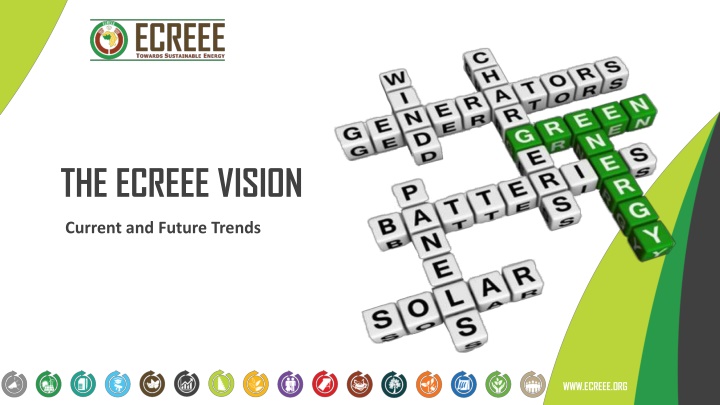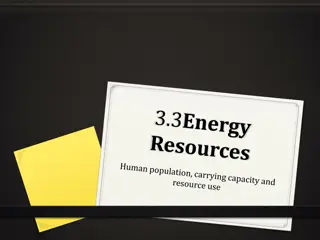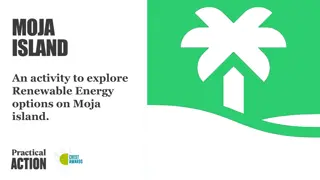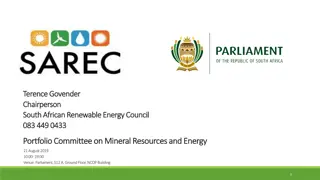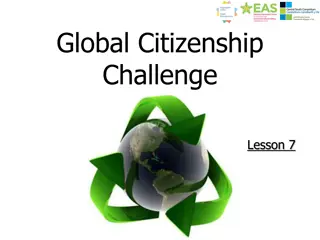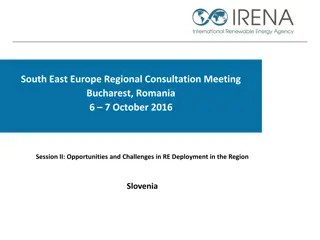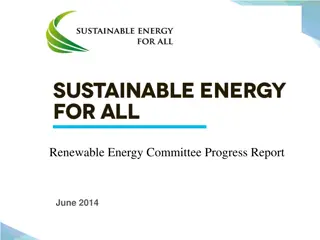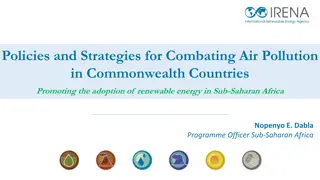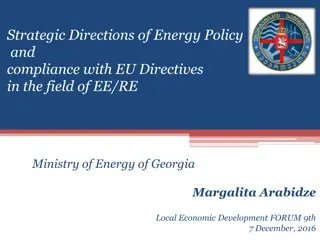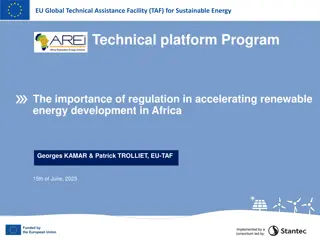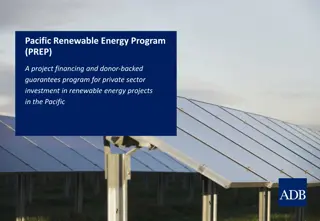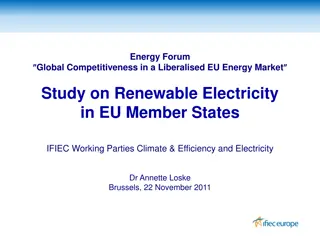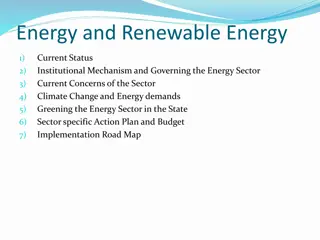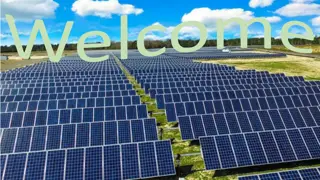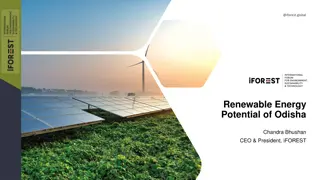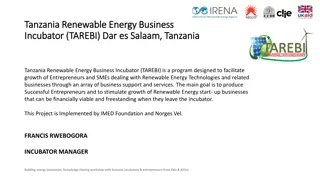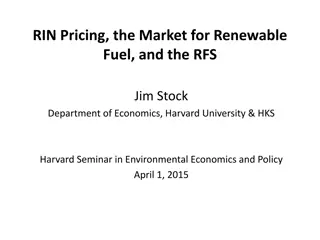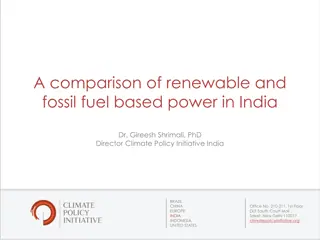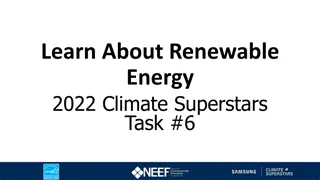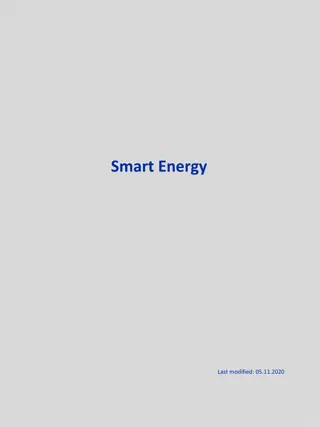Renewable Energy and Energy Efficiency in West Africa: Current Status and Future Prospects
The content discusses the vision, challenges, potentials, constraints, and establishment of the Economic Community for West African States (ECOWAS) Centre for Renewable Energy and Energy Efficiency (ECREEE) in West Africa. It highlights the region's significant renewable energy potentials, the barriers hindering their exploitation, and the role of ECREEE in promoting renewable energy and energy efficiency across the region.
Download Presentation

Please find below an Image/Link to download the presentation.
The content on the website is provided AS IS for your information and personal use only. It may not be sold, licensed, or shared on other websites without obtaining consent from the author.If you encounter any issues during the download, it is possible that the publisher has removed the file from their server.
You are allowed to download the files provided on this website for personal or commercial use, subject to the condition that they are used lawfully. All files are the property of their respective owners.
The content on the website is provided AS IS for your information and personal use only. It may not be sold, licensed, or shared on other websites without obtaining consent from the author.
E N D
Presentation Transcript
THE ECREEE VISION Current and Future Trends WWW.ECREEE.O RG WWW.ECREEE.ORG
THE ECOWAS REGION 15 countries with a land area of 5 million m2 Climate from semi-arid to humid tropical Population of over 300 million people 60% of population live in rural areas 11 of the 15 countries are LDCS and HIPIC Almost 176 million people have no access to electricity (52%) WWW.ECREEE.ORG
RE & EE POTENTIALS IN WEST AFRICA RE & EE play an important role in simultaneously addressing the energy challenges in West Africa RE potentials so far unexploited 23,000 MW of feasible large and small hydropower potential (16% exploited); Huge potential for all forms of bioenergy (e.g. biomass, biogas, biofuel); Average solar radiation of 5-6 kWh/m2 per day throughout the year; Considerable wind power potential in some countries; RETs are particularly effective in combination with EE measures; EE potentials so far unexploited Wide range of options to improve supply and demand side efficiency (including energy saving) e.g. Equipment labeling and building standards; e.g. Cleaner production in industry (e.g. process heat); e.g. Technical and commercial losses in the electricty system; WWW.ECREEE.ORG
CONSTRAINTS & BARRIERS Financial/Economics: High upfront costs of solar or wind compared with smaller scale conventional systems even where competitive; Lack of large scale projects at regional level to take advantage of higher solar or wind resource endowments and economies of scale; Lack of innovative financing mechanisms. Policy and Institutional Issues: Absence of political targets for renewable energy in general and solar/wind in particular, in many countries; Non-existent or weak policy measures for level playing field in many countries; Weak national agencies with unclear responsibility for solar/wind in many countries. Capacity Building & Technology Transfer Inadequate skilled technical manpower in many countries. Limited or no local manufacturing due to small national markets. Limited R&D with little or no linkages to entrepreneurial/ manufacturing sector. WWW.ECREEE.ORG
ESTABLISHMENT OF ECREEE ECREEE: Economic Community for West African States (ECOWAS) Centre For Renewable Energy And Energy Efficiency Established by Regulation C/REG. 23/11/08 of the 61st Session of the ECOWAS Council of Ministers on November 23, 2008. as the ECOWAS agency with the mandate to promote RE&EE markets Secretariat is based in Praia, Cape Verde with National Focal Institutions (NFIs) among all ECOWAS countries Established with support of core partners: Official Inauguration of the Centre on 6th July 2010 Governance Structure: Executive Board/Technical Committee ECREEE Business Plan with long-term vision by 2016 Annual Work Programmes: 2015 edition under execution Also the SE4ALL Focal Point for West Africa WWW.ECREEE.ORG
ECREEE FOUR MAIN PILLARS INVESTMENT AND BUSINESS PROMOTION CAPACITY DEVELOPMENT KNOWLEDGE MANAGEMENT POLICY SUPPORT Short-term training Long-term training Regional seminars Program activities Energy audits Study tours Exhibits Resource maps Research Policy Evaluation Project evaluation Communication Publicity Policy Development of regional policies Policy dialogue Support to national policies Analytical support Awareness raising Advocacy Projects database Policy dialogue Project preparation Financing Market Analysis EREF grants Advocacy WWW.ECREEE.ORG
REGIONAL SUSTAINABLE ENERGY POLICIES ECOWAS Renewable Energy Policy (EREP) and ECOWAS Energy Efficiency Policy (EEEP) developed with support of UNIDO, EU, Austria, Spain and GEF Validated by ECOWAS Experts Group Meeting, June 2012, Dakar Adopted by ECOWAS Energy Ministers during the High-Level Energy Forum, Oct 2012, Accra Adopted by the ECOWAS Council of Ministers, June 2013, Abidjan Adopted by the ECOWAS Authority of Heads of State and Government, July 2013, Abuja Regional policies represent a voluntary contribution of ECOWAS to the SE4ALL Initiative WWW.ECREEE.ORG
ECOWAS RE POLICY TARGETS BY 2020/2030 Grid-Connected RE Targets 2020 2030 RE share in total ECOWAS electricity mix (incl. large hydro) 35% 48% RE share in total ECOWAS generation capacity (excl. large hydro) 10% 19% 2.425 MW 7.606 MW Rural RE Targets 2020 2030 Rural population supplied by mini-grids and stand- alone system 22% 25% 60,000 3,600 MW 128,000 7,680 MW Mini-Grids to be installed Population served with improved stoves 60% 100% Population with access to LPG 17% 32% WWW.ECREEE.ORG
Conclusions Climate Change Climate Change 1. ECOWAS Focal Institution for the Sustainable Energy for all Initiative (SE4ALL) 2. ECOWAS Sustainable Energy Policy and Enabling Environment Program 3. Capacity Development Program 4. ECOWAS Observatory for Renewable Energy and Energy Efficiency (ECOWREX) 5. Project development and financing program 6. Energy Efficiency Program 7. Bioenergy Program 8. Gender mainstreaming in Energy access Program 9. Solar Thermal training and demonstration Program 10.West African Clean Cooking Alliance WACCA 11.Rural Electrification Program 12.ECOWAS Small Hydro program 13.Including 3 GEF programs: Guinea Bissau, Cape Verde and Gambia 9/8/2024
PARTNERS CORE NEW INVESTMENT http://www.ren21.net/Portals/_default/Skins/ren21-skins/img/ren21-logo.png http://www.cleanenergyministerial.org/Portals/2/EasyDNNNews/424/600401c1432EDNmainCleanEnergy_Logo_Web%20Event.png TECHNICAL OTHER WWW.ECREEE.ORG
